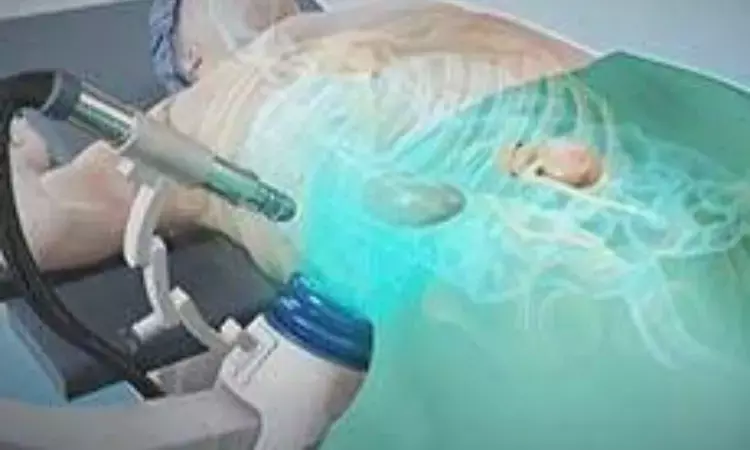- Home
- Medical news & Guidelines
- Anesthesiology
- Cardiology and CTVS
- Critical Care
- Dentistry
- Dermatology
- Diabetes and Endocrinology
- ENT
- Gastroenterology
- Medicine
- Nephrology
- Neurology
- Obstretics-Gynaecology
- Oncology
- Ophthalmology
- Orthopaedics
- Pediatrics-Neonatology
- Psychiatry
- Pulmonology
- Radiology
- Surgery
- Urology
- Laboratory Medicine
- Diet
- Nursing
- Paramedical
- Physiotherapy
- Health news
- Fact Check
- Bone Health Fact Check
- Brain Health Fact Check
- Cancer Related Fact Check
- Child Care Fact Check
- Dental and oral health fact check
- Diabetes and metabolic health fact check
- Diet and Nutrition Fact Check
- Eye and ENT Care Fact Check
- Fitness fact check
- Gut health fact check
- Heart health fact check
- Kidney health fact check
- Medical education fact check
- Men's health fact check
- Respiratory fact check
- Skin and hair care fact check
- Vaccine and Immunization fact check
- Women's health fact check
- AYUSH
- State News
- Andaman and Nicobar Islands
- Andhra Pradesh
- Arunachal Pradesh
- Assam
- Bihar
- Chandigarh
- Chattisgarh
- Dadra and Nagar Haveli
- Daman and Diu
- Delhi
- Goa
- Gujarat
- Haryana
- Himachal Pradesh
- Jammu & Kashmir
- Jharkhand
- Karnataka
- Kerala
- Ladakh
- Lakshadweep
- Madhya Pradesh
- Maharashtra
- Manipur
- Meghalaya
- Mizoram
- Nagaland
- Odisha
- Puducherry
- Punjab
- Rajasthan
- Sikkim
- Tamil Nadu
- Telangana
- Tripura
- Uttar Pradesh
- Uttrakhand
- West Bengal
- Medical Education
- Industry
Extremely slow, half-number shockwave lithotripsy as effective as standard for treating ureteral stones: Study

Japan: For the treatment of ureteral stones, the outcomes of extremely slow, half-number shockwave lithotripsy are comparable to the standard protocol, a recent study in the journal Urolithiasis has found.
Extracorporeal shock wave lithotripsy is a technique for the treatment of stones in the kidney and ureter that do not need surgery. In the procedure, high-energy shock waves are passed through the body and used for breaking stones into pieces as small as grains of sand. These small pieces can then easily pass from the body with urine.
Toru Kanno, Department of Urology, Ijinkai Takeda General Hospital, Kyoto, Japan, and colleagues conducted the study with the objective to elucidate and compare the safety and efficacy of the reduced (30 shocks/min with 1200 shocks/session) and standard protocols (60 shocks/min with 2400 shocks/session) of extracorporeal shockwave lithotripsy (SWL) for treating ureteral stones.
For this purpose, the researchers conducted a retrospective review between March 2014 and March 2021 of 2410 SWL procedures with reduced or standard protocols (groups R and S) in 1106 patients for ureteral stones.
Treatment success defined as the absence of residual fragments on ultrasonography and plain radiography within 30 and 90 days was the primary outcome. The association between the reduced protocol and treatment success was evaluated using a multivariate logistic regression and propensity score matching analysis. A total of 311 and 544 patients were included in the reduced (R) and standard (S) protocol groups, respectively.
The study led to the following findings:
- The patient's characteristics were comparable, excluding the lithotripter machine.
- No significant difference was observed between groups R and S in treatment success rates within 30 (63.3 vs. 65.8%) and 90 days (88.7 vs. 91.5%).
- The multivariate analysis indicated no significant association between reduced protocol and treatment success within 30 and 90 days.
- Propensity score matching showed no significant difference in the treatment success rates within 30 and 90 days.
The researchers conclude, "the outcomes of extremely slow, half number protocol are comparable to those of the standard protocol for the treatment of ureteral stones."
Reference:
Somiya, S., Koterazawa, S., Ito, K. et al. Extremely slow, half-number shockwave lithotripsy for ureteral stones. Urolithiasis (2022). https://doi.org/10.1007/s00240-022-01351-0
Dr Kamal Kant Kohli-MBBS, DTCD- a chest specialist with more than 30 years of practice and a flair for writing clinical articles, Dr Kamal Kant Kohli joined Medical Dialogues as a Chief Editor of Medical News. Besides writing articles, as an editor, he proofreads and verifies all the medical content published on Medical Dialogues including those coming from journals, studies,medical conferences,guidelines etc. Email: drkohli@medicaldialogues.in. Contact no. 011-43720751


